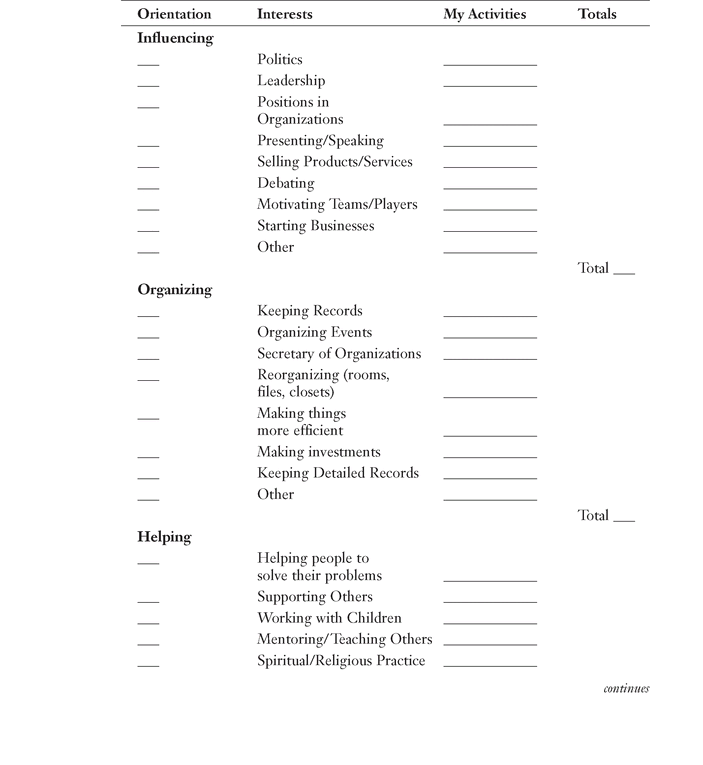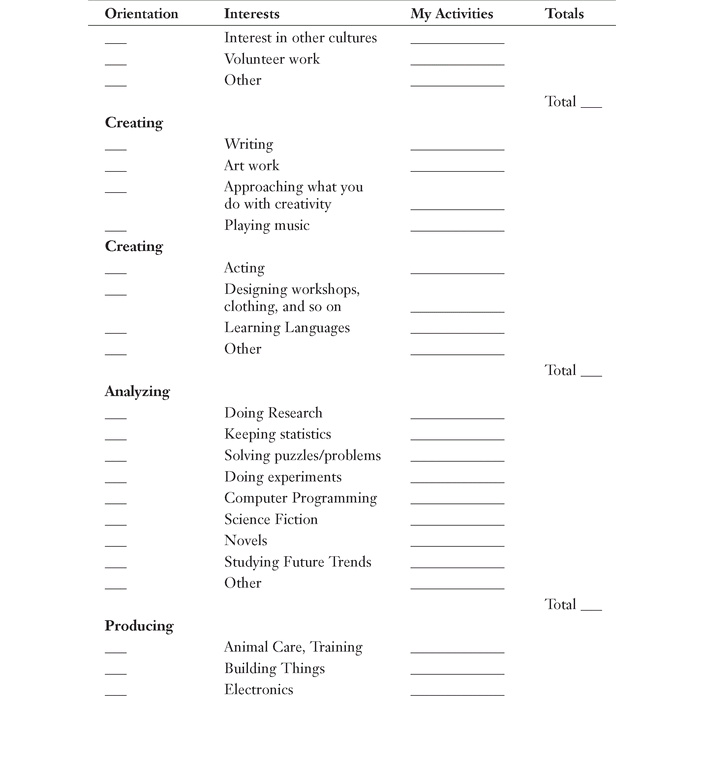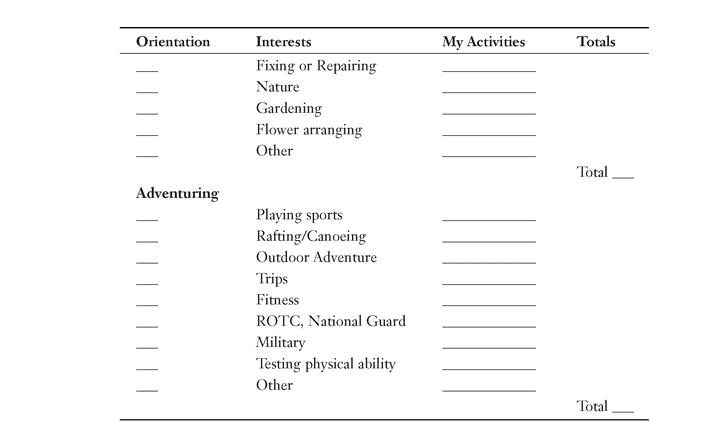Chapter 9
Your Interests
In this Chapter
• Understand the seven interest orientations
• Assess your own interests
• Prioritize your interests and map them to the seven interest areas
How do you gain a full understanding of your interests? Well you may have already begun by identifying interests you had in your youth. Or you may have developed more of your interests through extracurricular activities such as clubs, sports, or community groups. Perhaps you liked certain subjects in school more than others. Or you might have pursued relationships with people who were doing things you wanted to do. If you were lucky, you had a mentor to teach you and guide you in your interest. Other sources of determining our interests have to do with the books we read, the movies or shows we like, or what we do in our free time.

Career Lingo
A mentor is a person who agrees to show you the ropes—to be your guide. That means your mentor has to know quite a bit about the area you want to learn about. Suppose that you decide you are interested in collecting stamps. You locate the owner of a stamp collector shop. The owner agrees to teach you how to be a collector. This may include the types of stamps to collect, where you can locate the stamps, how to evaluate their worth, and so on. This person guides you through the whole process and gives you a complete picture of stamp collecting. Mentors are common in organizations to help new employees to learn “how we do things here.”
Seven Orientation Scales
The Seven Orientation Scales represent different clusters of interests that are found in major subsets of the world of work. Wouldn’t it be nice to know how your interests line up with the world of work?
David Campbell, author of the Campbell Interest and Skill Survey (CISS), lays out a way for us to understand just that. The CISS is a survey of self-reported interests and skills. Taking the CISS will help you to identify occupations in which people have interests similar to your own. It will also help you to determine the level of skill you have to meet job requirements. This survey is available onwww.KeirseyCampbell.com You may use the coupon on the last page in this book to take the Kiersey Temperament Sorter and the CISS for a reduced price.
We are using David Campbell’s descriptions of the seven interest orientations to guide you in thinking about your own interests. Each of the Seven Orientation Scale categories (Influencing, Organizing, Helping, Creating, Analyzing, Producing, Adventuring) is described in the sections that follow. Afterward, you will take a self-assessment of your interests in each category. For now, see which of these descriptions fits you the best.
Influencing Orientation
People with an Influencing Orientation are drawn to leading and influencing others. They like to make things happen—to take charge and get results. Generally confident about being able to persuade others to their viewpoints, they love to debate.
Public speaking and visibility are comfortable for them. Typical careers for Influencers have to do with being in charge—manager, director, superintendent, or politician.
Organizing Orientation
People with Organizing Orientations bring order and planning to their work environments. They manage projects, plan procedures, and directly supervise the work of others. They see themselves as efficient and productive members of the work force. Organizers are good at details and enjoy solving day-to-day problems. They understand budgets and cash flow and are often good at investing. Typical occupations for people with Organizing Orientations are accountants, financial planners, and administrative assistants.
Helping Orientation
People with Helping Orientations like to help and develop other people. They are compassionate and deeply concerned about the well-being of others. Helpers enjoy having close personal contact with others. They like to help others live full and satisfying lives. Helpers understand the feelings of others and provide emotional support. Typical occupations for Helpers include counselors, teachers, human resource personnel, and spiritual or religious leaders.

Stop-Look-Listen
Pinpointing our interests and looking to them for guidance in selecting our work is a two-edged sword. On the one hand, our interests give us such great information and clues about the kind of work that will really motivate us every day. On the other hand, not all of our interests can be met through work. It’s important to have a life beyond work. A life in which we can enjoy additional activities that give us joy and satisfaction. You can have it all—work you love and a life you really enjoy. The trick is not to put all your eggs in one basket—spread the wealth of your interests across your life.
Creating Orientation
People who have a Creating Orientation like to create new products, new visions, and new concepts in artistic areas. They see the world through innovative eyes and are frequently uncomfortable with traditional approaches. They are expressive and articulate. Typical occupations for Creators include artists, musicians, designers, and writers.
Analyzing Orientation
People who have an Analyzing Orientation are comfortable with data and numbers. They have a strong need to understand the world from a scientific viewpoint. They like working alone or in small groups in laboratories or academic settings. Analyzers need to be autonomous and like to work through problems by themselves. Typical occupations for Analyzers are scientists, medical researchers, statisticians, and doctors.
Producing Orientation
People who have a Producing Orientation like hands-on productive activities. They like to work with their hands and see the results of their labor. Working outdoors is often preferred by Producers. They are good with tools and new construction projects or repairing mechanical breakdowns. Typical occupations for Producers are mechanics, veterinarians, landscape architects, and carpenters.
Adventuring Orientation
People who have an Adventuring Orientation like to take risks, compete with others, and test their physical endurance. They enjoy physical activities and like competitive situations. They are confident in their physical skills and seek out excitement. Adventurers enjoy winning and bounce back when defeated. Typical occupations for Adventurers are sportsmen/women, military officers, police officers, and athletic coaches.
Orientation Scales Assessment
In column one (Orientation), place a check mark in front of those interests in column two (Interests) that represent activities you have been drawn to in your life experience. In column three (My Activities), list activities you have engaged in that are related to each of the interests listed in column two. In column four (Totals), count the number of activities you listed in column three for each interest.
Orientation Scales Assessment

Orientation Scales Assessment (continued)


Take your totals from column four for each of the orientations and list them here (also record each Total in your Career Profile Map in Appendix A):

List in order of priority, your three highest totals:

From the Interests listed in column two of the Orientation Scales Assessment table, write down the interests that would make it into your top five favorites.

These are your Top 3 Priority Orientations and your Top 5 Interests, make sure that you record them in your Career Profile Map in Appendix A.
Using Your Results
Consider the interest orientations that you engage in most often along with your five favorite interests. What do these interest areas tell you about yourself and what you might be looking for in a career? Write your thoughts down. Be sure to capture any careers or jobs that come to mind based on this exercise.

The Least You Need to Know
• Your interests can be matched to major work areas where people are doing jobs with interests similar to yours.
• David Campbell’s Seven Orientation Scales serve as a way to help you understand how your interests relate to these major work areas.
• The seven Orientations are: Influencing, Organizing, Helping, Creating, Analyzing, Producing, and Adventuring.
• Taking the time to identify your interests will prove pivotal in finding your perfect career.
..................Content has been hidden....................
You can't read the all page of ebook, please click here login for view all page.
